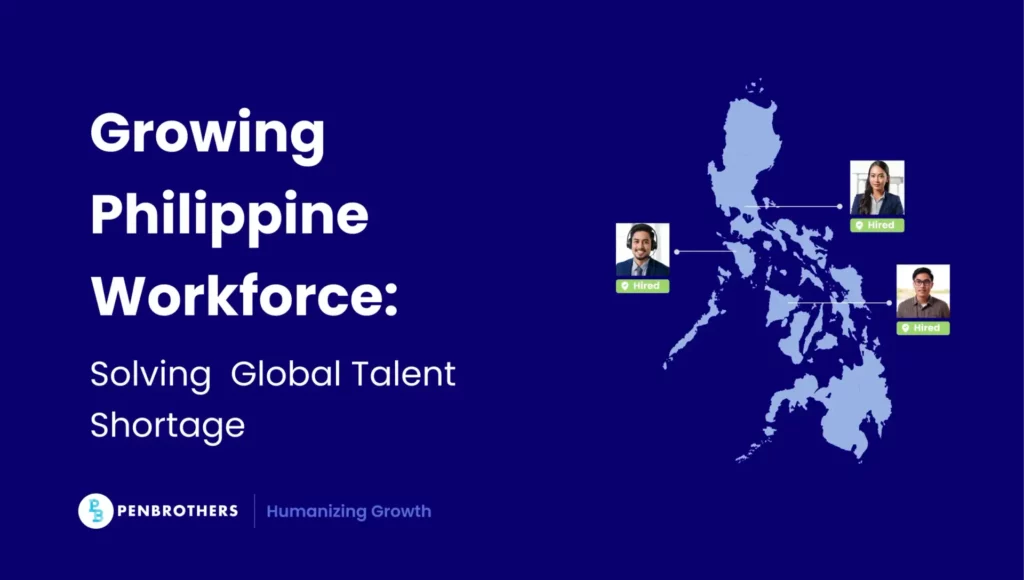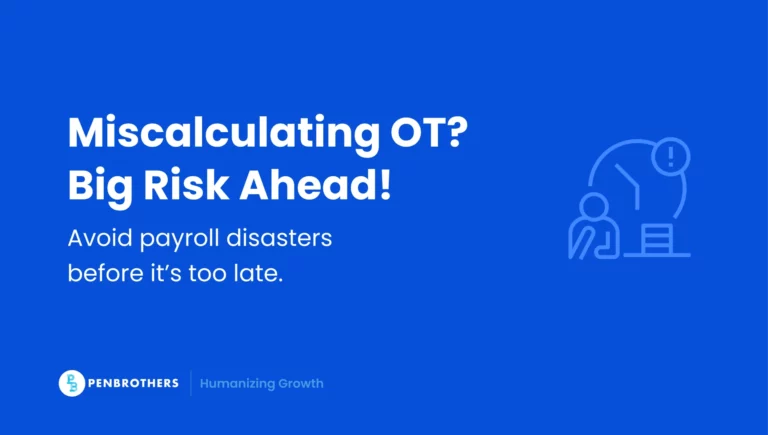Key Takeaways
- A Strategic Solution to the Global Talent Shortage: The Philippines’ large, growing, and skilled workforce provides a direct and effective solution for businesses worldwide that are struggling with the global talent shortage, especially in high-demand fields like technology and finance.
- A Unique Combination of Competitive Advantages: The Filipino workforce is highly sought after due to a powerful combination of factors: high English proficiency, a strong emphasis on education and skills development, significant cost-effectiveness (50-70% savings), and deep cultural compatibility with Western businesses.
- A Young, Growing, and Sophisticated Talent Pool: A key strategic advantage is the country’s “youth dividend.” With a median age of just 25.7 and over 700,000 university graduates annually, the Philippines offers a continuously expanding and digitally-native talent pool.
- Demand is Highest for Specialized, High-Value Roles: The most in-demand jobs being outsourced to the Philippines are no longer just administrative tasks. They are specialized, high-value roles such as Software Developers, Data Analysts, Digital Marketing Specialists, and Accountants, reflecting the increasing sophistication of the country’s workforce.
In today’s fast-paced, digitally driven world, businesses everywhere face one persistent challenge: the global talent shortage. According to a report by Korn Ferry, by 2030, there will be a talent deficit of more than 85 million workers globally, which could result in a loss of $8.5 trillion in unrealized annual revenue.
This shortage isn’t just about numbers—it’s about finding the right people with the right skills. As industries grow and technology evolves, the demand for skilled professionals intensifies, leaving companies scrambling to fill critical roles.
Enter the Philippines: a country whose workforce is rapidly gaining recognition for its ability to meet these global demands. With a growing pool of highly educated, English-speaking professionals, the Philippines is emerging as a powerful solution for businesses worldwide grappling with talent shortages.
According to the World Bank, countries in Southeast Asia, including the Philippines, have seen a significant increase in higher education enrollments, resulting in a younger, more educated workforce entering the global market. Many businesses, especially in the tech and startup sectors, are struggling to find the right candidates. And for companies aiming to scale quickly, these shortages can be crippling.
However, savvy leaders are starting to look beyond their borders. As more companies embrace remote work, many are discovering the Philippines offers an exceptional talent pool, ready and eager to help them grow.
Understanding the Global Talent Shortage
So why is the global talent shortage such a pressing issue? According to PwC’s Talent Trends report, technological advancements, especially in sectors like IT and software development, are outpacing the availability of skilled workers. Emerging technologies such as artificial intelligence, machine learning, and blockchain require specialized skills that many existing workers don’t yet possess.
A Gartner report supports this, stating that 64% of technology executives believe that the talent shortage is the most significant barrier to adoption of emerging technologies. In addition, aging populations in developed countries are leading to a shrinking workforce, while younger generations tend to prefer more flexible, project-based work. This creates a talent crunch that affects virtually every sector.
For business leaders, this scarcity creates a dilemma.
How do you maintain growth when you can’t find the talent to support it?
How do you stay competitive when your rivals are all hunting for the same people?
The answer, for many, lies in looking outward. Rather than relying solely on local talent pools, more companies are expanding their search globally—and the Philippines is proving to be a key player in this space.
Understanding the Challenges Faced by Businesses
Businesses today are facing mounting pressure to find skilled workers—and fast. CEOs and HR managers feel the pinch when they can’t fill crucial roles in time. According to a report by SHRM (Society for Human Resource Management), 83% of recruiters say that the talent shortage has made hiring a challenge. For tech leaders like CIOs and IT managers, the problem is even more acute. Software developers, cybersecurity experts, and data analysts are in short supply everywhere, leaving these leaders scrambling to keep projects on track. Meanwhile, startup founders and SME owners, who often operate on tight budgets, struggle to find affordable yet capable staff. These challenges aren’t just inconvenient—they’re potentially disastrous. Missing out on the right talent can delay product launches, hamper customer service, and ultimately stifle growth.
But it’s not just about finding any worker; it’s about finding the right fit. Cultural compatibility, language proficiency, and technical expertise all play a role in successful hiring. For global businesses, these criteria are often difficult to meet when sticking to local talent pools. Fortunately, the Filipino workforce excels in all these areas, making it an attractive option for businesses in search of scalable, cost-effective solutions.
The Filipino Workforce: A Rising Star in the Global Market
Why is the Philippines gaining so much attention in the global talent market? It comes down to a few key factors:
1. High English Proficiency
The Philippines ranks as one of the top countries in Asia in terms of English proficiency, according to the EF English Proficiency Index. This makes communication seamless for international companies. For businesses needing customer service representatives, content creators, or technical support staff, this is a critical advantage.
2. Education and Skills Development
Filipino universities produce a steady stream of graduates in fields like IT, engineering, business, and healthcare. According to the Philippine Statistics Authority, over 700,000 students graduate annually, and the country places a strong emphasis on continuous learning and skills upgrading, ensuring its workforce stays competitive on a global scale.
3. Cost-Effective Talent
Labor costs in the Philippines are significantly lower than in many Western countries. According to a Deloitte report on global outsourcing, businesses that outsource to the Philippines save an average of 50-70% on labor costs compared to hiring locally. This cost advantage doesn’t come at the expense of quality—Filipino professionals are known for their dedication, skill, and adaptability.
4. Remote-Work Readiness
The Philippines has long been a hub for business process outsourcing (BPO), making it well-prepared for the rise of remote work. In fact, a survey by LinkedIn revealed that the Philippines ranks as one of the top 10 countries for remote job postings, with a workforce that’s already experienced in delivering results remotely for companies in the U.S., Australia, and Europe.
5. Cultural Compatibility
The Philippines shares many cultural similarities with Western countries, especially the U.S. and Europe. A report by Frost & Sullivan highlights that this cultural alignment contributes to smoother collaboration and more productive working relationships.
These factors make the Filipino workforce an ideal solution for companies looking to address the global talent shortage. But how can businesses effectively tap into this resource?
What is the Percentage of Workforce in the Philippines?
The Philippines boasts one of Southeast Asia’s most dynamic labor forces, with approximately 48.3 million people in the workforce as of 2024, representing about 65% of the working-age population.
But here’s what makes this number strategically significant: Unlike many developed nations facing aging demographics, the Philippines maintains a median age of just 25.7 years. This youth dividend translates into a continuously expanding workforce, projected to grow by 1.5-2% annually through 2030.
The composition reveals why global businesses are taking notice:
- Services sector: 58.4% of the workforce
- Agriculture: 22.9%
- Industry: 18.7%
Within that services sector lies the real opportunity. Over 1.3 million Filipinos work in BPO and IT-enabled services alone, with another 2 million in professional and technical roles. These aren’t just numbers. They represent a massive pool of educated, English-speaking professionals ready for global opportunities.
What’s particularly compelling is the education pipeline feeding this workforce. With over 700,000 university graduates entering the job market annually and a literacy rate exceeding 96%, the Philippines isn’t just maintaining its workforce. It’s continuously upgrading it.
For businesses evaluating offshore options, this means access to a talent pool that’s not only large but growing more sophisticated each year.
What is the Most In-Demand Job in the Philippines?
The Philippine job market tells a fascinating story about global business evolution. Based on 2024 labor market data and recruitment trends, here are the roles companies struggle most to fill:
Top 5 Most In-Demand Roles:
- Software Developers and Engineers The surge in digital transformation has created an insatiable demand. Full-stack developers, particularly those skilled in React, Python, and cloud technologies, receive multiple offers. The gap between supply and demand drives salaries up 15-20% annually.
- Digital Marketing Specialists Not just any marketers: specialists in SEO, paid advertising, and marketing automation. Companies need professionals who understand both creative storytelling and data analytics. The best ones juggle 3-4 job offers simultaneously.
- Accountants and Financial Analysts With the global accounting shortage, Filipino CPAs are increasingly valuable. Those with experience in international accounting standards and cloud-based accounting systems are particularly sought after.
- Customer Success Managers Beyond basic customer service, companies need professionals who can manage relationships, reduce churn, and drive account growth. Bilingual capabilities and SaaS experience command premium rates.
- Data Analysts and Scientists The explosion in business intelligence needs has created massive demand. Professionals skilled in SQL, Python, and visualization tools like Tableau can virtually name their price.
Emerging High-Demand Roles:
- AI and Machine Learning Specialists (300% growth in job postings)
- Cybersecurity Analysts (250% increase in demand)
- UX/UI Designers (180% growth year-over-year)
What’s driving this demand? Three converging forces: global digital transformation, the Philippine education system’s STEM focus, and increasing international recognition of Filipino talent quality.
For businesses, this means two things. First, these roles will cost more than traditional outsourced positions, expect to pay 30-50% premiums for specialized skills. Second, partnering with established providers becomes crucial, as they’ve already built networks within these competitive talent pools.
The opportunity remains massive, but success requires understanding these market dynamics and positioning accordingly.
How Penbrothers is Bridging the Talent Gap
Penbrothers, a leading offshore staffing company based in the Philippines, has been at the forefront of helping businesses around the world access Filipino talent. Our unique approach goes beyond simply filling roles. We focus on long-term partnerships, ensuring that our clients not only find the right people but also experience seamless onboarding, integration, and support throughout their journey.
1. Customized Recruitment
We understand that each business is different, and so are their staffing needs. Penbrothers takes the time to understand the specific requirements of each client, from technical skills to cultural fit. This allows us to identify and recruit the best candidates for your company.
2. End-to-End Support
Our services don’t stop at recruitment. We help manage the entire employment process, from onboarding and training to performance tracking and employee engagement. According to Deloitte Insights, companies that prioritize employee experience during onboarding see a 60% improvement in employee retention. This means less administrative burden for your team and more focus on growth.
3. Talent Retention and Development
At Penbrothers, we believe in nurturing talent for the long term. We provide ongoing support to ensure that our professionals stay engaged, motivated, and aligned with your company’s goals. This reduces turnover and ensures that your team remains stable and productive.
4. Scalability
Whether you need one employee or an entire team, Penbrothers offers scalable solutions. A report from Everest Group shows that businesses leveraging offshore staffing models can scale their operations up to 20% faster than those relying solely on local hiring. We help businesses grow at their own pace, providing the flexibility to scale up or down as needed.
Our success stories speak for themselves. From helping startups expand their teams without breaking the bank to enabling larger companies to build fully remote global operations, Penbrothers has been instrumental in solving the talent shortage for businesses across industries.
Case Study 1: How Spot Ship Built a World-class Data Team
Spot Ship, a UK-based maritime start-up that needed to quickly scale its development team to meet an aggressive timeline. Struggling to find the right talent locally, they turned to Penbrothers for help.
In less than 30 days, we had built a team of skilled Filipino data entry specialists who not only met the technical requirements but also integrated seamlessly with the start-up’s existing team. As the team grew, data managers enabled a speedier and well structured operations. The collaboration started with 14 members in 2022 and grew to 129 members which evolved to other specialized roles in several departments. Here’s the breakdown of the Spot Ship’s Filipino talents hired under Penbrothers along with their salary comparisons:
Data Entry Associate Annual Salary Comparison
| Philippines: | USD 13,000 |
| United States: | USD 49,400 |
Data Team Manager Associate Annual Salary Comparison
| Philippines: | USD 14,400 |
| United States: | USD 149,500 |
Senior Data Analyst Annual Salary Comparison
| Philippines: | USD 13,300 |
| United States: | USD 131,300 |
When it comes to payroll, this start-up was able to save over $6 million. As the company grows, it is also able to ensure that costs are managed well while delivering consistent results.
According to a Gartner study, companies that leverage offshore staffing can reduce project timelines by 30%, which was exactly the case for this startup. The result? Highly satisfied customers and a faster project execution.
Case Study 2: Small Australian Company Grows Massively with Filipino Talents
In another example, Australia-based Designcrowd had HR challenges that caused high employee turnover. The freelance designers could not keep up with the growing demands. Additionally, just like other small businesses, there were concerns in timely payroll processing and being compliant with benefits that are government-mandated.
Penbrothers provided a dedicated team of Filipino workers to manage their HR operations and payroll. This nimble team started in 2016 with six headcount. This team also ensured to be compliant consistently. As Designcrowd scaled, it expanded its offshored roles to cover customer service, accounting, and marketing.
As the company grew, the Philippine team is now composed of 182 members who are fulfilling essential tasks in diverse departments. Along with the massive growth of Designcrowd comes massive savings through sustainable offshoring strategy. The team is on track to save over $10.6 million in payroll.
This collaboration proves that growth-focused companies can look into offshoring specialized tasks so that they can focus on important aspects of their businesses. See how the full story of Designcrowd here:
These are just two examples of how Penbrothers is helping businesses overcome talent shortages by leveraging the power of the Filipino workforce.
Conclusion: The Time to Act is Now
The global talent shortage isn’t going away anytime soon, but that doesn’t mean your business has to suffer. According to a World Economic Forum report, the companies that act now to secure skilled talent will have a significant competitive advantage in the years to come. By tapping into the growing workforce in the Philippines, you can not only fill critical roles but also gain a competitive edge. The cost-effective, highly skilled professionals available through Penbrothers can help your company thrive in today’s challenging business environment.
How much could your business benefit from expanding its talent reach to the Philippines?
The answer might surprise you. Don’t wait for the competition to take the best talent—contact Penbrothers today to find out how we can help you build a world-class team.
Ready to solve your talent challenges? Explore the opportunities that Penbrothers offers by visiting our website or signing up for a consultation. Let’s build your future, one talented professional at a time.
Frequently Asked Questions
The Philippines addresses the talent shortage by providing a large, continuously growing pool of highly educated and skilled professionals at a cost-effective rate. Key strengths like high English proficiency and cultural alignment with Western countries make it easier for global companies to integrate Filipino talent and fill critical roles that are difficult to hire for locally.
The main attractions are a unique combination of high English proficiency, a strong educational system that produces over 700,000 graduates annually, significant labor cost savings of 50-70%, and a high degree of cultural compatibility that leads to smoother collaboration with Western teams.
The most in-demand roles are in high-skill areas. The top five are Software Developers and Engineers, Digital Marketing Specialists, Accountants and Financial Analysts, Customer Success Managers, and Data Analysts and Scientists. Emerging roles like AI specialists and cybersecurity analysts are also growing rapidly.
The workforce consists of approximately 48.3 million people. A key advantage is its youth; the median age is only 25.7 years, which means the talent pool is dynamic, digitally native, and continuously expanding.
An offshore staffing partner simplifies the entire process of building a team. They handle the customized recruitment to find the right talent, manage end-to-end support including onboarding, HR, and payroll, and focus on talent retention and development, allowing the client company to gain the benefits without the administrative burden.






